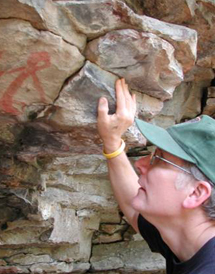George Sabo III, a research archeologist for the Arkansas Archeological Survey stationed at the University of Arkansas and professor in the department of anthropology, recently returned from Knoxville, Tenn., where he was a guest of the University of Tennessee department of anthropology’s 39th annual Visiting Lecture Series.
For over three decades the Lecture Series has invited a group of significant anthropologists to the University of Tennessee campus in order to give the department access to cutting edge research. Graduate and undergraduate courses are built around each year's visitors. This semester the focus is anthropology and religion with speakers from the various anthropological disciplines whose work focuses on the human religious experience.
Sabo was invited to present two lectures (on Oct. 22 and 23) based on his research into the belief systems and intellectual lives of ancient American Indians through study of art images on various artifact media.
In “Sky People, Earth People: Rock Art and Religion in Ancient North American Landscapes,” Sabo presents the results of a six-year study of rock art in Arkansas. Images painted or engraved onto natural rock surfaces, circa A.D. 1500–1700, mapped their makers’ religious principles onto culturally created landscapes in the Central Arkansas River Valley. Rock art distributions reflect a spatial division of categories (for example, earth/sky, human realm/spirit realm) similar to those expressed in Dhegiha Siouan religious traditions, suggesting that study of the landscape contexts of ancient art can yield valuable insights into otherwise elusive religious beliefs and practices of the past.
Sabo’s second lecture, “Heroes on a Half Shell: Reading Religion in Spiroan Art,” concentrates on recent collaborative research by a team of scientists including Alex W. Barker, the late Robert A. Hall, and Sabo, under the direction of James A. Brown. The team analyzed images on engraved shell cups and gorgets from the Spiro site in Oklahoma. Though extensively damaged by Depression-era looters, the Craig Mound “Great Mortuary” at Spiro remains one of the most important archeological features in eastern North America. Study of the images has enabled the team to outline a mythic narrative associated with the mid-15th century construction of the Great Mortuary, thus offering a new reading of this complex archeological feature as a world renewal ceremony performed at a time of extraordinary stress. This narrative gives insights into the content and organization of Mississippian religion and the florescent culture of pre-Columbian eastern North America.
Topics
Contacts
Deborah Sabo, Research Assistant
Arkansas Archeological Survey
575-2161,
